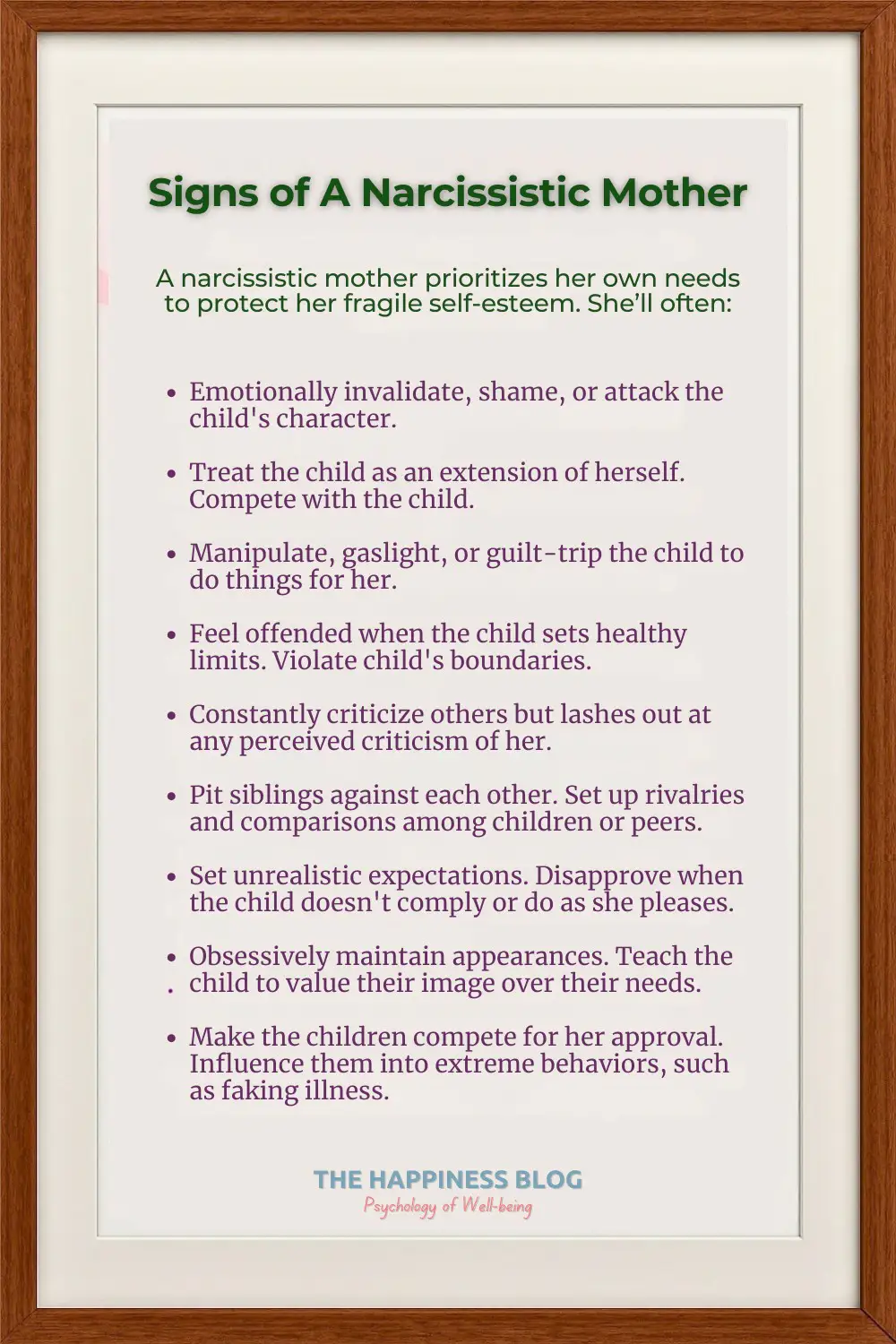Today's Saturday • 9 mins read
— By Dr. Sandip Roy.
Victims of narcissistic relationships come with layers of trauma inside. Of all close ties, parents, partners, and siblings, a narcissistic mother leaves the ugliest mark on her daughters.
These daughters often work hard to hide their scars, yet give out subtle signs of the hurt.
For one, they become sacrificers and people-pleasers in their relationships. Inside, they are trying to prevent others from re-gashing the wounds their mother caused.
Read on to know the ten most heartbreaking symptoms of a daughter with a narcissistic mother.
10 Symptoms of A Daughter of A Narcissistic Mother
Here are the 10 symptoms of trauma response among daughters of narcissistic mothers:
1. Feeling unworthy and constantly seeking validation.
You constantly try to win the approval of the person you are with. You go to great lengths to please this person.
Even if you do everything to please them, you still don’t feel you are good enough until they say they are happy with you. This comes from a deep-rooted sense of low self-worth and low self-esteem.
You were conditioned to believe that your worth was what your mother said it was.
Her years of control, criticism, and withholding love created an emotional reward system where her brief moments of approval were what you lived for and craved.
Because your sense of self became externally anchored to your mother’s unpredictable feedback, you tend to:
- Feel like an impostor despite achievements
- Feel guilty when putting your needs first
- Cannot easily trust your own judgments
- Find it hard to accept compliments
- Be perfect and flawless
- Apologize excessively

2. Likely to have anxiety, panic, or depressive disorders.
If you had a narcissistic mother, you likely developed a hypervigilant nervous system. This was a way to survive in a psychologically unsafe place.
Her unpredictable nature kept you perpetually alert, constantly looking for threats.
Did her mood change?
Is she irritated with how you served her?
Does she want something, but wants you to guess and do it without her telling you?
You learned early that your calm moments could be shattered by her critical comment, a disapproving look, or an emotional outburst.
So you took to walking on eggshells around her, training your brain and senses to operate in a constant state of fight-or-flight.
Over time, this makes you more susceptible to:
- Persistent anxiety that seems to have no clear cause
- Panic assaults that can strike even in “safe” situations
- Deep depressive episodes that feel overwhelming
- Difficulty fully relaxing or feeling truly safe
- Intrusive thoughts and a racing mind
The emotional labor of managing your mother’s narcissistic needs while suppressing your own emotions often creates a perfect storm for chronic anxiety and depression.
This heightened state of arousal also has physical outcomes. You may develop symptoms like digestive issues, headaches, fatigue, sleep disturbances, and nightmares.
3. Trust issues with other relationships.
You have difficulty trusting others.
If your mom’s a narcissist, trusting others might feel like a high-stakes gamble you’re bound to lose.
This difficulty in trusting others is a survival tactic you learned from your mother’s narcissistic abuse.
Her inconsistent emotional support has left you wary, always wondering when the next letdown will come.
This isn’t just about doubting others; it’s a deep-rooted skepticism that can seep into every relationship you have.
So your positive expectations from others are always low, even non-existent. You go into new relationships believing they will eventually break your trust, so why trust them?
Realizing that this trust issue stems from your mother’s behavior can be the first step in learning how to build healthy, trusting relationships.

4. You constantly fear being left behind, and have clingy behavior.
Fear of Abandonment:
Living with a narcissistic mom can make the fear of abandonment a constant companion.
You might find yourself clinging to relationships, terrified of being left alone. You feel autophobia, the fear of being alone, even when you know it is irrational.
Often, being clingy is a survival tactic you developed to avoid the emotional void your narcissist left you with. You are responding to old wounds, protecting yourself the only way you knew how.
Recognizing this fear as a product of your upbringing can help you build more secure, balanced relationships.
5. Erratic mood swings make it hard to have stable relationships.
Emotional Instability:
Unexplained emotional ups and downs can feel like a roller coaster that you never signed up for.
One minute you’re fine, the next you’re not, and it’s hard to pinpoint why. It may often start with a mild headache, and then quickly devolve into a low mood.
This emotional instability isn’t just random; it’s a byproduct of growing up with a narcissistic mom who herself was a storm of unpredictability.
This can make stable relationships a challenge, as you’re always bracing for the next emotional dip or surge.
Understanding this can be the first step in learning how to regulate your emotions better.

6. Feel overly responsible for other people’s happiness, not your own.
Growing up with a narcissistic mom, you likely learned that her love and attention were conditional.
You had to “earn” love, praise, and respect from her by meeting her needs or boosting her ego.
Pure love, as that between a mother and her children, is unconditional love.
But she sets you up for a pattern where you have to dutifully serve her need to be loved.
And you carry this people-pleasing behavior into other relationships, thinking that’s the way to be valued.
It’s like you’re unconsciously programmed to make everyone else happy, even if it drains you.
You might find yourself always saying yes, even when you want to say no.
This urge to please is not just about being nice; it has become your coping mechanism to avoid rejection and dispute.
This can be exhausting and leaves little room for your own emotional needs.
7. Have difficulty setting boundaries, exposing yourself to exploitation.
Poor Boundaries:
A narcissistic mother never teaches you what healthy boundaries look like.
You probably heard her drill it into your head that boundaries and personal space are for selfish people.
Even if you had set up a few, they blatantly violate those, proving your boundaries don’t matter.
She routinely invaded your personal space, disregarded your feelings, or used you to meet her own emotional needs.
You never even realize that you have a natural right to set healthy boundaries in every relationship of yours.
And this sets you up for exploitation later in life. You become an easy target for people who take advantage of your willingness to give and self-sacrifice.
You might find it hard to say No, even when you should, because you’re afraid of upsetting others or being rejected.
This is a tough cycle to break, but you must learn to set up healthy boundaries for your emotional well-being.
8. Strive for unrealistically high standards, leading to burnout.
Unattainable Perfectionism:
A narcissistic mom constantly makes you feel like you’re always falling short of her expectations.
She sets unrealistically high standards for you, making you believe that anything less than perfect is a failure.
Nothing you do is ever good according to her standards. Actually, she wants you to fall and fail, so that she can always keep you trying to work harder to reach the set bar.
This streak of perfectionism makes you think it’s not about doing your best, but rather about avoiding criticism and gaining approval.
The constant striving can be exhausting, both mentally and physically, often leading to burnout.
You might find yourself working tirelessly, only to feel like you’ve never done enough. This unattainable perfectionism can rob you of the joy that comes from genuine achievement.
9. Lean heavily on your partner for emotional needs and decision-making.
Co-narcissism & co-dependency:
Living with narcissistic parents can create “co-narcissism” — the way that people accommodate narcissistic parents.
A co-narcissist takes on the narcissist’s responsibilities, focuses more on the narcissist’s feelings than their own, and looks outside themselves for decision-making. They are highly loyal, resilient, and flexible, which makes them susceptible to the narcissist’s manipulations.
You also become co-dependent.
When your mother is a narcissist, emotional support is often in short supply. You might find yourself leaning too much on your romantic partners to fill that emotional void.
This can create a co-dependent dynamic where you’re not just sharing love and support, but also seeking validation and emotional stability from someone else.
This puts a strain on the other person in your relationship, as you expect them to “mother” you.
This excessive emotional dependency on others can make you an easy target for people who want to take advantage of your need for validation.
10. Struggle to understand or communicate your own emotions.
Difficulty Identifying Emotions:
A narcissistic mother makes it extremely tough for her daughter to understand or even express her own emotions.
This is more than becoming a “closed-off” person.
This inability to recognize emotions comes from years of emotional neglect or manipulation.
It starts with trying to “deregister” and “unrecognize” the negative emotions. Later, this turns into a deep-rooted confusion about how to spot and feel even positive emotions.
You’ve probably spent too much time navigating your mom’s emotions that you’ve forgotten how to feel your own feelings.
This can spill over into your relationships, making open and honest communication a real challenge.
It’s like you’re speaking a language but missing some of the keywords that help convey what you really feel.
- You might want to read this: 12 Cruel Ways Narcissist Mothers Treat Their Daughters
Final Words
The deep impact of a narcissist mother affects how your nervous system processes stress, emotions, and relationships.
This isn’t a weakness or character flaw – it’s a natural response to growing up in an environment where emotional safety was consistently compromised.
If you think your emotional insecurities come from your narcissist mother, but feel overwhelmed to cope with them alone, reach out to a psychological counselor.
√ Also Read: What Happens When A Narcissist Knows You’ve Figured Them Out
√ Please spread the word if you found this helpful.
» You deserve happiness! Choosing therapy could be your best decision.
...
• Disclosure: Buying via our links earns us a small commission.